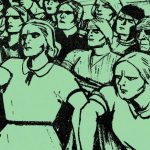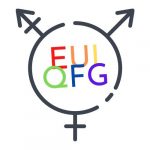Käthe-Leichter-Gastprofessur an den Kulturwissenschaftlichen Fakultäten der Univ. Wien
Zeit: 12.01.2022, 18:30-20:00 Uhr
Ort: virtueller Raum
Die Käthe-Leichter-Gastprofessur wird im Wintersemester 2021/22 von der Kunst- und Kulturwissenschaftlerin Beáta Hock vom Leibniz-Institut für die Geschichte und Kultur des östlichen Europa (GWZO) in Leipzig bekleidet (Web). Am 12.01.2021 wird sie die Käthe-Leichter-Vorlesung halten. (Die Vorlesung war vormals geplant für 15.12.2021 und ist – aktuell – virtuell konzipiert.)
Bei dem Vortrag werden geschlechtergeschichtliche Fragen mit einer transnationalen Perspektive auf eine osteuropäischen und europäischen Kunstgeschichte und Geschichte verbunden.
Teilnahme
Für den Zugang zum virtuellen Raum der Veranstaltung registrieren Sie sich bitte hier (Link).
Zur Käthe-Leichter-Gastprofessur (Web)
Die Einrichtung der Käthe-Leichter-Gastprofessur geht auf eine Förderung durch das Bundesministerium für Wissenschaft und Verkehr zurück. Die Universität Wien möchte damit ihr Lehrangebot zur Frauen- und Geschlechterforschung erweitern und ihm neue Impulse geben. Der mit dieser Professur verbundene Charakter der Internationalität und der Interdisziplinarität findet darin seinen Ausdruck, dass sie alternierend von den einzelnen Instituten der beiden kulturwissenschaftlichen Fakultäten betreut wird und durch sie die Kontakte mit der internationalen Frauen- und Geschlechterforschung verstärkt werden sollen. Weiterlesen … (Web).
Author Archives: Redaktion
Tagung: Das Recht auf sexuelle Selbstbestimmung, 24.-25.02.2022, Berlin
DFG-Forschungsprojekt „Menschenrechte, queere Geschlechter und Sexualitäten seit den 1970er Jahren“ (Web)
Zeit: 24.-25.02.2022
Ort: Berlin
Anmeldung bis: 31.01.2022
Die Organisator:innen interessiert, auf welche Weise das Konzept der sexuellen Selbstbestimmung verflochten ist mit Konzepten von Autonomie, Individualität/Subjektpositionen/Identität auf der einen Seite sowie anderseits mit kollektiven Vorstellungen etwa von „Sittlichkeit“ und Moral. Ausgehend von den Debatten der ersten deutschen Frauenbewegung(en) im Kaiserreich sowie der ersten deutschen Homosexuellenbewegung und vor dem Hintergrund der normativen Grundlagen des RStGB, das 1872 in Kraft trat, möchten sie fragen, wie und in welchen historischen Kontexten das Recht auf Sexualität, auf sexuelle Selbstbestimmung, sexuelle Orientierung sowie sexuelle Vielfalt als schutzwürdig gefordert, und in welchen Konflikt- und Spannungsfeldern es definiert wurde.
In den Blick geraten dabei die Anerkennung und Gleichstellung nicht-(hetero)normativer Sexualitäten und Geschlechter, aber auch die Regulierung von Beziehungen und Partner:innenschaften durch rassifizierte Verbote oder Tabuisierungen von Sexualität für Menschen mit Behinderungen oder der Einfluss der Kirchen. Insgesamt streben die Organisator:innen eine intersektionale Betrachtung unter Einbeziehung von Kategorien wie race, class, gender, dis/-ability/body sowie Religion an.
Es wird gefragt: Welche Akteur:innen und Bewegungen waren an den Forderungen um sexuelle Selbstbestimmung beteiligt? Welche Transferprozesse zwischen Recht, Wissen und politischen Bewegungskollektiven lassen sich dabei ausmachen? Wie weiteten sich die Forderungen nach sexueller Selbstbestimmung in die (Menschen)rechte? Weiterlesen und Quelle … (Web).
Sektionen
- Das Recht auf Selbstbestimmung in Fachdebatten
- Sexuelle Selbstbestimmung in Debatten der Weimarer Republik
- Abtreibungsdebatten
- Sexuelle Selbstbestimmung in schwulen und lesbischen Bewegungen seit den 1970er Jahren
- Wer hat das Recht auf sexuelle Selbstbestimmung?
Abendvortrag
- Elisabeth Holzleithner: Das Recht auf sexuelle Selbstbestimmung heute. Perspektiven der Legal Gender Studies
CfP: The Emergence of Gendered Power Structures since Early Modern Times: Practices, Norms, Media (Event, 11/2022, Marburg); by: 15.01.2022
Forschungsnetzwerk Geschlecht • Macht • Staat (Web)
Zeit: 23.-25.11.2022
Ort: Philipps-Universität Marburg
Einreichfrist: 15.01.2022
Since the late 15th century, discursive and social practices as well as media representations of power, sovereignty, and gender can be observed in relation to contemporary processes of early state formation, which aim at a specific consolidation and expansion of hierarchical gender orders. Throughout the centuries, strategies to legitimize specific power relations have employed above all historically grown traditions in their argumentation, the powerful impact of which allegedly shows in the longue durée. An analytical focus on continuities, however, threatens to obscure historical ruptures as well as reinterpretations and reframings of earlier media representations. Inconsistencies and conflicts between norms and social practices are also likely to fall from view.
Therefore, the interdisciplinary research network „Gender • Power Relations • State“ in cooperation with the Center for Gender Studies and Feminist Future Studies (UMR) and the Center for Media and Interactivity (JLU Gießen) will host an international and interdisciplinary 2-day conference, to examine the power relations at work in the construction, dissemination, and persistence of such narratives and to analyze their interrelations with social practices, processes of standardization, and media representations.
The conference aims to study the interdependent web of tensions between gender, power relations, and the state across centuries. Transformations, renegotiations, and revisionings in specific configurations of gendered power will be brought into focus. The intersection of institutionalizations of state power with naturalizing gender discourses specific to the respective epochs will be problematized from the angles of manifold disciplinary approaches to gender studies. In doing so, a progress- and modernization-oriented master narrative of increasing gender equality will be confronted with the limitations and closures of a scope of opportunities and possibilities to women through processes of formalization and legalization in the course of state formation until the 21th century.
Such an interdisciplinary and transepochal merging and further developing of existing analytical approaches and perspectives has not yet been attempted. The organizers assume that such an interdisciplinary and historically profound synopsis along the analytical levels of … read more and source (Web).
Klicktipp: Finding Women in the Sources: Women’s labour activism in Eastern Europe and transnationally (ZARAH-Weblog) – new postings online
 ZARAH: Women’s labour activism in Eastern Europe and transnationally (Web)
ZARAH: Women’s labour activism in Eastern Europe and transnationally (Web)
In February 2020, the ZARAH project started. It is an ERC-advanced-grant-project on women’s labour activism in Eastern Europe and transnationally, from the age of empires to the late 20th century.
ZARAH explores the history of women’s labour activism and organizing to improve labour conditions and life circumstances of lower and working class women and their communities – moving these women from the margins of labour, gender, and European history to the centre of historical study. Read more … (Web).
ZARAH weblog
In September 2020, the ZARAH weblog started. The first blog series were „Finding Women in the Sources“ and „Putting Activists Centre Stage“. A few days ago, the 3rd series „Transnational Links“ was launched. More contributions will follow at regular intervals until spring 2022.
This ontributions have been published so far (Web):
Series III: Transnational Links and the History of Women’s Labour Activism
- Alexandra Ghit, Olga Gnydiuk, and Eszter Varsar: An Introduction to the Blog Series III
- Ivelina Masheva: Exchange and Cooperation between Bulgarian Communist Women and the International Women’s Secretariat of the Comintern in the early 1920s
- Alexandra Ghit: Solidarity and Inequality: European Socialist Women’s International Organizing in the Interwar Period
Series II: Putting Activists Centre Stage
- Zhanna Popova and Veronika Helfert: An Introduction to the Blog Series II
- Alexandra Ghit: Tatiana Grigorovici: Ambiguities of a Social Democrat’s Career
- Zhanna Popova: Halina Krahelska: Multifaceted Activist Legacy
- Ivelina Masheva: Ana Maimunkova: Trials and Tribulations of a Communist Activist
- Veronika Helfert: Gabriele Proft: A century of Labour Related and Political Activism Continue reading
CfP: Transgressive Bodies. Grenzüberschreitende Körper und Soziale Ordnungen (Event, 06/2022, Bochum); bis: 31.01.2022
 Forschungsgruppe: Transgressive Bodies; Ruhr-Universität Bochum (Web)
Forschungsgruppe: Transgressive Bodies; Ruhr-Universität Bochum (Web)
Zeit: 07.-09.06.2022
Ruhr-Universität Bochum
Einreichfrist: 31.01.2022
Aktuelle gesellschaftliche und weltpolitische Herausforderungen, hervorgegangen aus technischen Innovationen, Globalisierung, Migration und Digitalisierung bringen neue Phänomene der Grenzüberschreitung hervor. Die Erschaffung und Perfektionierung virtueller Realitäten verschiebt z. B. gewohnte Betrachtungsweisen auf das Verhältnis von Mensch und (Um-)Welt zugunsten einer neuen Dimension des Erlebten. Dies stellt die Wissenschaften vor die Herausforderung, die Auswirkungen auf Selbst- und Weltdeutungen, soziale Hierarchisierungen und Verhandlung von Werten neu zu analysieren. Während auf der einen Seite die physischen Grenzen des Menschen durch neue Technologien (wie KI, Robotik, Prothetik) zunehmend überschritten werden, stellt sich auf der der anderen Seite die Frage, ob nationale, ethnische, geschlechtliche und kulturelle Grenzen demgegenüber fest verankert sind – ein Beleg für unterschiedliche Veränderungen von Ordnungen?
Die Tagung entsteht im Anschluss an eine interdisziplinäre Forschungsgruppe, die sich seit 2017 mit Fragen der Grenzziehungen und der Körperlichkeit auseinandersetzt und die enorme wissenschaftliche und gesellschaftliche Produktivität von transgressive bodies in den Blick nehmen will. Das transdisziplinäre Projekt verbindet unterschiedliche Fachrichtungen und schlägt eine Brücke zwischen Naturwissenschaften und Geisteswissenschaften. Beteiligt sind u. a. Geschichtswissenschaften, Medizin, Medienwissenschaft, Amerikanistik, Theologie und Religionswissenschaft.
Mit dieser Tagung verspricht sich das Projekt neue Impulse zu sammeln und sich neuen Diskursen zu stellen. Mögliche Fragen und Themenfelder sind u. a.: Technik und Körper, Virtual Reality, (De-)Konstruktion von Körpergrenzen, Körperliche Normierungen, Wissenschaftskritik, Leibphänomenologie / Körperwissen, Gender und Sexualität, Dis/ability.
Bitte senden Sie ein Abstract Ihres Vorschlags mit maximal 2000 Zeichen (inkl. Leerzeichen) sowie einer Kurzvita bis zum 31.01.2022 an Continue reading
CfP: 2022 Annual Conference of the Sexuality Studies Association (05/2022, virtual space); by: 15.01.2021
 Sexuality Studies Association (SSA) (Web)
Sexuality Studies Association (SSA) (Web)
Time: 20.-22.05.2022
Venue: virtual space
Registration by: 15.01.2022
The SSA welcomes proposals for the 10th annual meeting. The conference will be hosted independently and will feature a blend of synchronous and asynchronous programming that includes paper presentations, a keynote lecture by Ann Cvetkovich, plenaries led by Ricky Varghese and others to be announced, and an Annual General Meeting.
Unlike previous years, in 2022 the organizers are going without a conference theme, dedicating this year’s meeting to reflecting on and celebrating ten years of our association. The Programming Committee encourages submissions from across disciplines and subject areas. The goal is to create a program that shares cutting edge sexuality studies research, demonstrating the diversity of the interdisciplinary field as it has grown over the last decade. This year’s conference, despite being virtual once again, is a milestone and celebration for the association!
The SSA is a scholarly association for scholars, artists, activists, and all community members who have an interest in the teaching and study of sex, sexuality, and gender diversity. The SSA provides opportunities to connect the broader research, artistic, and activist communities, and encourages us to listen deeply, mentor, and support each other in our work.
The organizers invite proposals for presentations in English or French from any disciplinary, interdisciplinary, or transdisciplinary approach. Presentations will be in individual paper formats. Paper proposals in the form of 300-350 word abstracts can be submitted through our online conference site in either English or French. The deadline for submission is January 15, 2022. Applicants will be notified of their acceptance by the end of February, 2022. Accepted papers can be uploaded in the form of an extended abstract (1200 words, including bibliography) or a pre-recorded talk/video (7 mins) and will be due May 15, 2022.
Applicants are not required to be members of the association at time of submission. If selected for presentation as part of the conference, 2022 membership dues must be paid. To become a member of the SSA you can register through the website (Web).
At this time, the SSA is also inviting nominations for our two annual awards. To be considered for the SSA’s Emerging Scholar Award please review the Continue reading
Lecture: Shane Bobrycki: Plague, War, Migration, Climate Change, Sex, and the Demographic Riddle of the Early Middle Ages, 13.12.2021, virtual space
 Ancient & Medieval Studies Colloquium
Ancient & Medieval Studies Colloquium
Time: Mo. 13.12.2021, 5:15pm (Eastern Time, US and Canada) | 23:15 (Europe)
Venue: virtual space, via Vienna
The medieval historian Marc Bloch wrote that the „fundamental characteristic“ of early medieval Europe (c. 500–1000 CE) was „the great and universal decline in population“ that opened the period. Many economic and social historians have agreed. Between the fifth and the seventh centuries, cities and towns diminished by orders of magnitude; some vanished entirely. Settlement density declined almost everywhere. Only gradually did cities and populations recover, a process that gained speed only after 1000.
Few question that this demographic pattern had profound economic, social, and political consequences for early medieval history. But historians are less sure why it happened in the first place. What caused populations to drop off in the post-Roman West? Why did they remain low for so long? Why did the demographic fate of the West differ from that of its „sibling cultures“ around the Mediterranean, the Byzantine and Islamic worlds? In this talk, Shane Bobrycki reassess the usual suspects for early medieval European demographic history: epidemic disease, endemic warfare, migration, climate change, and the reproductive choices of early medieval families. He will argue that in each case we need to spend more time thinking about the mechanics of causation.
Register: https://mit.zoom.us/meeting/register/tJMsfu6orTgoGNHxnIrNKPjsfZLRfYpj-fcz
After registering, you will receive a confirmation email containing information about joining the meeting.
CfP: Queer Pedagogies (Event, 05/2022, Florence); by: 10.01.2021
 Queer and Feminist Studies Interdisciplinary Working Group (Web)
Queer and Feminist Studies Interdisciplinary Working Group (Web)
Time: 30.-31.05.2021
Venue: Firenze/Florenz/Florence
Proposals by: 10.01.2021
Promoting the acceptance of sexual and gender diversity in education is increasingly under attack across Europe and beyond. Queer-feminist activists, the proponents of gender studies as well as queer-friendly youth and educational organisations face fierce opposition from right-wing extremists, religious fundamentalists and other groups with conservative agendas. Given these challenging circumstances, the organizers want to create a space where practitioners, academics and activists gather to discuss, without too much clamour, various themes related to queer pedagogies.
By this the organizers mean in the broadest sense the queer transfer of knowledge and the transfer of queer knowledge, whether it occurs in formal educational settings, in subcultural spaces, in online environments or within families, chosen or otherwise. Questions that papers may engage with … read more (PDF).
Keynotes and invited speakers:
- Michela Balocchi (Dep. of Culture, Politics and Society & Co-founder of Intersexioni, Italy)
- Dominik Kuc (Ranking of LGBTQ-friendly Schools, Growspace Foundation, Poland)
- Stephan Mills (Intersex youth group of Intersexioni, Italy)
- Martin Lücke (History Dep., FU Berlin, Germany)
- Gracia Trujillo (Sociology Dep., Univ. Complutense de Madrid, Spain)
The Queer and Feminist Studies working group at the European University Institute (EUI)
The working group provides an environment for various discussions on different issues related to queer and feminist theory. The working group organises discussions on papers written by EUI researchers, exchange of thoughts on feminism, gender, and queer movements and invitation of guest speakers. Researchers studying gender and sexuality from historical, political, sociological, legal, and economic perspectives … read more (Web).
CfP: Was ist radikal? – Revolutionäre Konzepte und militante Strategien im Kontext von Feminismus und Arbeiter:innenbewegung (ZS OeZG 2/2024); bis: 30.04.2022
Österreichische Zeitschrift für Geschichtswissenschaften (OeZG); Theresa Adamski und Gabriella Hauch (Web)
Einreichfrist: 30.04.2022
Am 29. Oktober 2021 fand der 15. Workshop des „Forschungsschwerpunkts Frauen- und Geschlechtergeschichte der Historisch-Kulturwissenschaftlichen Fakultät der Universität Wien“ zum Thema „Was ist radikal? – Revolutionäre Konzepte und militante Strategien im Kontext von Feminismus und Arbeiter:innenbewegung“ statt (Link). Die Fragen, die im Rahmen des Workshops aufgeworfen und diskutiert wurden, dienen als Ausgangsbasis für den inhaltlichen Fokus der Ausgabe. Ein kritischer Umgang mit begrifflichen Kontrastpaare wie radikal/konservativ, modern/traditionell oder progressiv/reaktionär, die Einbettung von Radikalitätskonzepten in den Rahmen postkolonialer Kämpfe und ein Fokus auf Intersektionalität zählten zu den Forschungsdesideraten, die die Diskussion begleiteten.
„Radikal sein“ war und ist einerseits Selbstidentifikation und Ausdruck politischer Haltung. Andererseits dient der Radikalitätsbegriff als Projektionsfläche für Normierungsprozesse und Ausschlussmechanismen sowie politische, soziale und religiöse Kämpfe. In den 1880ern agierte etwa die „Radikale Arbeiter-Partei“ als antiparlamentarischer Flügel der österreichischen Sozialdemokratie. Das „radikal“ im Namen der Organisation hieß — in Abgrenzung zu reformorientierten Strömungen innerhalb der Arbeiter:innenbewegung – vor allem „revolutionär“. Auch die militanten Suffragetten in Großbritannien und den USA zielten auf grundlegende gesellschaftliche Veränderungen. Ihre Forderungen polarisierten: Laut der österreichischen Arbeiterinnenzeitung 1913 etwa hätten die Proletarierinnen nichts von den Suffragetten zu erwarten, auch wenn letztere sich „noch so radikal gebärden“. Dennoch erhielten sie durchaus auch aus marxistischen und anarchistischen Kreisen Anerkennung für ihre „direkte Aktion“. Zuschreibungen des Radikalen fanden hier explizit entlang der Differenzkategorien Klasse und Geschlecht statt.
Radikalitätsbegriffe dienen aber auch als diskursive Marker für race und Religion, für Dis/Ability, Sexualität und Geschlechteridentitäten. Der „radikale Feminismus“ der 1970er etwa ist aufgrund der transfeindlichen Positionen mancher seiner Vertreter_innen (den im englischsprachigen Raum sogenannten „trans exclusionary radical feminists“) bis heute Gegenstand queer-feministischer Kritik. Aufgrund der Heterogenität jener Orte, wo Radikalität ausgehandelt wird, muss einmal mehr die Frage gestellt werden: Was ist radikal? Weiterlesen … (PDF).
Lecture: Walter L. Koppmann: The Jewish Working Class of Buenos Aires, 1905–1930. Worlds of Labor, Left Political Cultures, and Urban Experience, 07.12.2021, virtual space
WISO Abendkolloquium Uni Wien und WU Research Seminar in Economic and Social History
Zeit: Di., 07.12.2021, 18.00–19.30 Uhr
Ort: virtual space, via Vienna, Zoom: https://univienna.zoom.us/j/93646285636?pwd=dE9RY3N0VFd3N2RjbU0wbFRYTXlPUT09
- Moderation: Lisa Hoppel
This lecture will examine the history of the Jewish working-class immigration that arrived in Buenos Aires between 1905 and 1930. Jewish immigration gained visibility between 1905 and 1906, when more than 20,000 people exiled in Buenos Aires, escaping from political reaction, anti-Semitic xenophobia, and Tsarist’s pogroms. Beyond Europe, the two main destinations were New York and Buenos Aires. Whereas many relevant studies explored the American Yiddish labor movement, the history of early Yiddish labor migration in Argentina still lacks scholar research.
Since the beginning of the 20th century, Jewish workers shaped a relevant ethnic community in Buenos Aires. By 1914, they were the third largest group of immigrants, behind Italians and Spaniards. Yiddishkait, as a common cultural and generational background, brought together multiple common senses, social practices, and historical memories from different parts of the world.
The „Russians“, as Jewish migrants were called in Argentina, no matter their country origin, accounted for less than 5 per cent of the population of Buenos Aires – 1 million in 1909 – but represented a significant political actor. Identified in the public opinion as a dangerous and subversive social group, Jewish migrants were usually associated with terrorism, violence, and women trafficking. Although several studies have addressed the latter, Yiddish world of labor tended to be marginalized from scholar interests. The main question of the research could be summarized as follows: what was ‚unique‘ or peculiar about Jewish working-class‘ experience in Buenos Aires?
Walter L. Koppmann (Buenos Aires, 1990) holds a PhD in History from the University of Buenos Aires and is a postdoctoral fellow of CONICET based at the Ravignani Institute, and in the Netherlands, at the International Institute of Social History and the Centre for Latin American Research and Documentation (CEDLA – Universiteit van Amsterdam). One of his most recent publications deals with „Masculinities and political subjectivization in the Argentine labor movement at the beginning of the 20th century.“ Read more … (Web)
Quelle: wiso-informationen@lists.univie.ac.at
